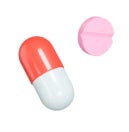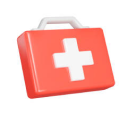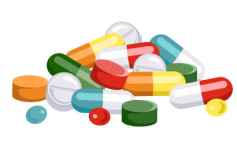Leflunomide
Uses
What is Leflunomide for?
Leflunomide is a disease-modifying anti-rheumatic drug (DMARD) that helps to slow down joint damage, reduce inflammation (swelling and pain) and disability caused by autoimmune joint disease (e.g. rheumatoid arthritis and peripheral spondyloarthritis).
How should I take or use Leflunomide?
- Leflunomide tablet(s) may be taken with or without food. It should be swallowed whole without chewing and works best when taken at the same time every day.
- Leflunomide dose ranges from 10 mg to 20 mg daily. Alternate day dosing may also be used for some patients. The dose may vary depending on your disease activity (disease severity) and response to medication.
- Leflunomide does not work immediately. It may take up to 12 weeks before the full benefits of this drug are seen. Thus, it is important to take your medicine regularly, otherwise you may not benefit at all.
- Do not stop taking your medication without checking with your healthcare professional.
- Leflunomide may be prescribed to be taken with other medicines (e.g. Corticosteroids) used for treating rheumatoid arthritis.
What should I do if I forget to take or use Leflunomide?
If you miss a dose, take the missed dose as soon as you remember. If it is almost time for your next dose, skip the missed dose and continue with your regular dose. Do not take double doses to make up for the missed dose.
Precaution
What precautions should I take when taking or using Leflunomide?
Inform your healthcare professional if:
- You are allergic to this medication or any of the other ingredients of this medication.
- You are pregnant or planning to become pregnant as leflunomide can cause serious birth defects to an unborn baby.
- You are taking any other medications, including over-the-counter medicines, supplements, traditional medications and herbal remedies.
- You develop a fever, sore throat or other infections. See a doctor immediately because Leflunomide may reduce your immune response and cause some infections to become more severe. Inform the doctor whom you consult that you are taking Leflunomide. During this period, you may temporarily stop taking Leflunomide for 1-2 weeks until you recover.
- Inform your doctor before any surgeries as Leflunomide may increase the risk of infections after the operation and/or slow down wound healing.
Conception and breastfeeding precautions:
- Reliable contraceptive measures must be used to avoid unplanned pregnancy for women on Leflunomide. Measures that are not reliable include the use of condom and diaphragm and the withdrawal method.
- Women who wish to become pregnant while on Leflunomide or after stopping Leflunomide will need to take another medication, Cholestyramine, to help remove Leflunomide from their body. Without this, pregnancy should be strictly avoided for up to 2 years after stopping Leflunomide. If you suspect that you are pregnant while on Leflunomide, inform your doctor immediately. As Leflunomide may be found in breast milk, women are advised not to breastfeed.
- After taking Cholestyramine, it is recommended for women to avoid becoming pregnant for at least 3 months.
- For men who are considering to have children, the continued use of Leflunomide may be considered. Please discuss with your primary rheumatologist.
What food or medication should I avoid when I take or use Leflunomide?
- Avoid overcrowded places and consumption of raw or undercooked food.
-
Pneumococcal and Influenza (flu) vaccinations are safe and may be given if required. Avoid live vaccines such as MMR (measles, mumps and rubella), OPV (oral polio vaccine), yellow fever or BCG (tuberculosis). Discuss with your doctor before receiving any vaccines.
- Direct contact with persons who have taken oral polio vaccine or those with infections should be avoided.
- Avoid alcohol consumption while taking Leflunomide as alcohol can increase the risk of liver toxicity.
Side Effects
What are some common side effects of Leflunomide?
-
Nausea, vomiting, diarrhoea, abdominal pain, loss of appetite or weight loss
- Take medication after food to reduce the side effects. Sucking hard, sugar-free candy may reduce nausea and vomiting. Inform your doctor if symptoms are severe or if you experience loss of appetite.
-
Headache, dizziness, weakness
- Usually improves as you get used to the medication.
-
Loss of hair
- It is reversible when the medicine is stopped.
-
Increased blood pressure
- Check your blood pressure regularly. Consult your doctor if high blood pressure persists.
What are some rare but serious side effects that I need to seek medical advice immediately?
The symptoms of a drug allergy include one or more of the following:
- Swollen face/eyes/lips/tongue
- Difficulty in breathing
- Itchy skin rashes over your whole body
-
Lung infection / lung disease (rare side effect)
- Symptoms: Cough with or without fever, shortness of breath or difficulty breathing
-
Blood disorder (rare side effect)
- Warning signs: Unusual bleeding or bruising, lip or mouth ulcers with flu-like symptoms. In some cases, there may be no warning signs.
- It is important to monitor the effects of your new treatment, especially during the first three months of treatment. For your safety, you need to do regular blood tests for monitoring.
Handling
How should I store Leflunomide?
Store in a cool and dry place, away from direct sunlight. Keep this medication away from children.
How do I throw away Leflunomide safely?
Pack this medication into a black trash bag and seal it tightly before throwing it into the rubbish chute or bin.
Disclaimers
If you take more than the recommended dose, please seek medical advice immediately. The information provided on this page does not replace information from your healthcare professional. Please consult your healthcare professional for more information.
This article is jointly developed by members of the National Medication Information workgroup. The workgroup consists of cluster partners (National Healthcare Group, National University Health System and SingHealth), community pharmacies (Guardian, Unity and Watsons) and Pharmaceutical Society of Singapore. The content does not reflect drug availability and supply information in pharmacies and healthcare institutions. You are advised to check with the respective institutions for such information.
Last updated on Jun 2022

Need More Medicine?
Use Medicine Order Service on HealthBuddy.

Medicines Reminder
Get reminders and chart progress on HealthBuddy.
© 2025 SingHealth Group. All Rights Reserved.


























































